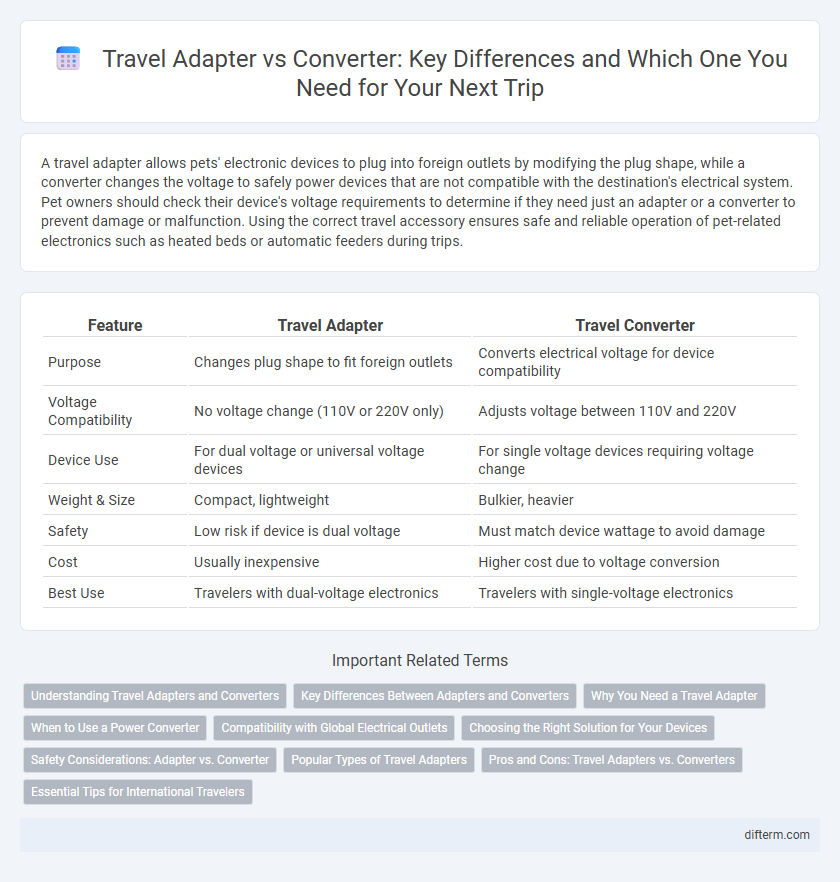A travel adapter allows pets' electronic devices to plug into foreign outlets by modifying the plug shape, while a converter changes the voltage to safely power devices that are not compatible with the destination's electrical system. Pet owners should check their device's voltage requirements to determine if they need just an adapter or a converter to prevent damage or malfunction. Using the correct travel accessory ensures safe and reliable operation of pet-related electronics such as heated beds or automatic feeders during trips.
Table of Comparison
| Feature | Travel Adapter | Travel Converter |
|---|---|---|
| Purpose | Changes plug shape to fit foreign outlets | Converts electrical voltage for device compatibility |
| Voltage Compatibility | No voltage change (110V or 220V only) | Adjusts voltage between 110V and 220V |
| Device Use | For dual voltage or universal voltage devices | For single voltage devices requiring voltage change |
| Weight & Size | Compact, lightweight | Bulkier, heavier |
| Safety | Low risk if device is dual voltage | Must match device wattage to avoid damage |
| Cost | Usually inexpensive | Higher cost due to voltage conversion |
| Best Use | Travelers with dual-voltage electronics | Travelers with single-voltage electronics |
Understanding Travel Adapters and Converters
Travel adapters enable travelers to plug their electronic devices into foreign outlets by altering the plug shape without changing voltage, essential for compatibility in over 150 countries. Voltage converters transform electrical voltage to match device requirements, preventing damage from incompatible power sources, particularly critical when using high-wattage appliances. Selecting the right device depends on the destination's electrical standards and the specific power needs of the traveler's electronics.
Key Differences Between Adapters and Converters
Travel adapters enable the physical connection of your device's plug to foreign outlets without altering voltage or frequency, making them ideal for electronics compatible with the destination's power specifications. Converters transform the electrical voltage and frequency to match your device's requirements, preventing damage to appliances incompatible with the local power supply. Understanding these key differences ensures safe and efficient use of electronics during international travel.
Why You Need a Travel Adapter
A travel adapter is essential for plugging your electronics into foreign outlets with different plug shapes, ensuring compatibility without altering voltage. It enables the use of chargers, phones, and laptops safely in countries with diverse socket types. Unlike converters that change voltage, adapters simply allow connectivity, making them lightweight and ideal for frequent international travelers.
When to Use a Power Converter
Use a power converter when your electronic device's voltage does not match the destination country's electrical system, typically converting 220-240 volts to 110-120 volts or vice versa. Power converters are essential for appliances that have no built-in voltage compatibility, such as hair dryers, curling irons, or older electronics. Check the device's voltage specifications before travel to avoid damage and ensure proper operation with the converter.
Compatibility with Global Electrical Outlets
Travel adapters allow devices to physically connect with various global electrical outlets by modifying plug shapes without altering voltage, ensuring compatibility across different countries' socket designs. Voltage converters, however, adjust the electrical current to match device requirements, essential for regions with differing voltage standards to prevent damage or malfunction. Understanding the distinction ensures travelers can safely and efficiently power devices in diverse international locations.
Choosing the Right Solution for Your Devices
Selecting the right travel adapter or converter depends on your device's voltage requirements and plug type compatibility. Travel adapters only change plug shapes to fit foreign outlets, while converters modify voltage to prevent damage to sensitive electronics. Understanding device specifications and destination power standards ensures safe and efficient charging during international travel.
Safety Considerations: Adapter vs. Converter
Travel adapters enable compatibility between plug shapes without altering voltage, ensuring device safety only if the voltage matches the destination supply. Voltage converters modify electricity voltage to protect devices designed for different power ratings, preventing damage or hazards from incorrect voltage use. Choosing the correct device based on voltage requirements and equipment specifications is critical for safe international travel.
Popular Types of Travel Adapters
Popular types of travel adapters include plug adapters, universal adapters, and USB adapters, each designed to fit electrical outlets in different countries. Plug adapters change the plug shape without converting voltage, making them ideal for countries with compatible voltage but different plug designs. Universal adapters offer multiple plug types in one device, while USB adapters provide convenient charging options for smartphones, tablets, and other USB-powered gadgets during international travel.
Pros and Cons: Travel Adapters vs. Converters
Travel adapters enable compatibility between different plug types by physically connecting devices to foreign outlets without altering voltage, making them lightweight and ideal for charging low-wattage electronics like laptops and smartphones. Converters transform electrical voltage to match the device's requirements, crucial for high-wattage appliances such as hairdryers or irons, but tend to be bulkier and more expensive. Choosing between adapters and converters depends on the destination voltage and the power specifications of the electronic devices to avoid damage or inefficiency during travel.
Essential Tips for International Travelers
Travel adapters are essential for fitting your device plug into foreign outlets, while converters adjust voltage to prevent damage to electronics. Choose a travel adapter with multiple plug types and USB ports for versatility across different countries. Always verify your devices' voltage compatibility before relying on a converter to avoid potential electrical hazards during international trips.
travel adapter vs converter Infographic

 difterm.com
difterm.com